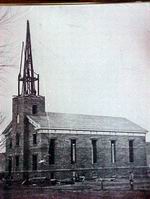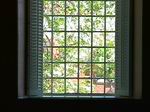
Windows for the St. George Tabernacle
In March 19, 1942 and January 1943, true stories from the life of David H. Cannon, Youngest son of George Cannon, the immigrant, and his wife, Wilhelmina (Aunt Willie) Mousley Cannon were broadcast over the Columbia Broadcasting System on "Death Valley Days" programs, The first incident, called "Sego Lilies," pictured Aunt Willie, a sensitive, tenderly reared young woman from Delaware, pioneering Utah’s desert Dixie. With all the hardships, she suffered most from the lack of refinement and beauty. Disheartened, she told her young husband that if he would show her one single thing about the place which was beautiful, she could be satisfied to remain and work for the future. He finally brought her a sego lily, whose exquisite loveliness inspired her to renewed effort.
The second episode was called "Faith of Our Fathers." for brevity we have here paraphrased it:
Ten years had elapsed since the pioneers entered St. George. Meantime, while still subsisting on the barest necessities, they were busily engaged in the erection of a costly tabernacle.
A million feet of lumber had been hauled eighty miles by team and wagon. The baptismal font, cast in Salt Lake City, was drawn over three hundred miles by oxen.
Early one evening David Cannon came hurrying home to his wife and little son David with the exciting news that the glass for the tabernacle windows, after making the voyage all the way from New York around Cape Horn, had arrived in San Bernardino by freight team. David had been commissioned to leave in a week with wagons and team to bring it the remainder of the way. It was left to him to assemble the necessary outfits, as well as to raise the money - eight hundred dollars - to pay the freight charges due at the end of its journey.
His wife Wilhelmina, known as "Willie," was dismayed at the idea of gathering
all that money in a week - and that from people who, as she said, "during the
last two years have already pinched and scraped - gone without food and clothing
and decent food, even - to dig up the last possible penny they could spare:
couldn’t they wait until spring?"
Postponing the trip would produce two alternatives; either leaving the empty widows gaping all winter with the glass only three hundred miles away, or of risking a trip across the mountains in a snow by wagons heavily loaded with glass. Bother were unthinkable to David.
He replied to his wife’s question, "Was there ever a time when the folks of this colony weren’t hard up –when they weren’t just recovering from floods or drought or famine or sickness?" Still his certainty of their ability to do whatever might be required was unwavering.
"It’s the duty of every one of us," he continued, "the duty and the privilege - to contribute all we can to it - in labor and in money. Even Davey here is not too young."
David Jr. piped up: "I offered to go with you, sir an’ help you haul the glass from San Bernardino - but you said "no."
David was amused.
Perhaps there’s something else you can do."
The child pondered, then reluctantly said; "Course I - I have got a two-cent piece I"ve been saving–" "Yes?" If it’ll help any you can have it."
Thank you, son"
Willie colored. "Davey, you put me to shame!" Turning to her husband, she made her offering. "There’s three dollars and a half in silver I had put away toward a new dress. I was going to send to Salt Lake for some red cashmere. But I can do without it for another year, I guess."
David Cannon was only about to raise $200 of the $800 needed to pay the freight bill for the windows. see Peter Neilson for information on the gift of $600 to complete the amount required to make up the $800.
(note form the Webmaster. David Jr. was my wife's Grandfather. The family remembers that when David Jr. was in in his late 90"s, he told the story of the windows and that he could remember hearing the gold coins drop on the kitchen table when they were counting the money just before leaving to go to pick up the windows.